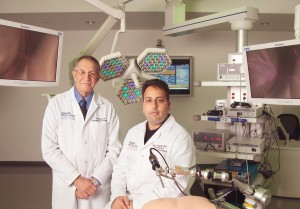- India Medical Mission 2018 - November 1, 2018
- Sleep Disorders: Sleep Apnea and Upper Stimulation Therapy - August 25, 2015
- The Naked Vocalist Podcast Featuring Dr. Reena Gupta - May 27, 2015
- New Therapy for Sleep Apnea – First Sleep Pacemaker placed in California at Osborne Head and Neck Institute. - December 12, 2014
- Boxer’s Ear: Can your ear explode? - December 12, 2014
- Nose Picking (Rhinotillexis) and Septal Perforations: Why I should stop picking my nose…? - November 24, 2014
- Deviated Septum and Septal Perforation - July 28, 2014
- Hereditary Hemorrhagic Telangiectasia: Nasal Septal Perforation Repair - June 25, 2014
- Dr. Mantle recognized at the Beverly Hills Medical Science Academy Awards - May 8, 2014
- Commonly Misdiagnosed Pathologies: Arteriovenous Malformations - April 9, 2014
 When actor Michael Douglas first revealed he suffered from stage IV tongue cancer in August of 2011, the primary focus was on the aggressive treatment that would be required. Now cancer-free, he recently released a statement that his cancer was caused by oral sex.
When actor Michael Douglas first revealed he suffered from stage IV tongue cancer in August of 2011, the primary focus was on the aggressive treatment that would be required. Now cancer-free, he recently released a statement that his cancer was caused by oral sex.
“Without wanting to get too specific, this particular cancer is caused by HPV, which actually comes about from cunnilingus,” stated Douglas.
This brings up many questions, particularly these days when human papilloma virus (HPV) is everywhere. Indeed, the high prevalence of HPV was what led to the development of Gardasil, a vaccine that targets HPV type 6, 11, 16, and 18. It is recommended this vaccine be given during adolescence, before any sexual contact, to protect young women from this virus.
Why is HPV dangerous?
Human papilloma virus (HPV) is a virus that causes many different diseases, including genital warts. However, certain types of HPV are known risk factors for cancer of the genital region. Recently it is also becoming clear that HPV is a risk for head and neck cancer.
HPV also causes respiratory papillomas, warty growths that occur most commonly on the vocal cords but may also spread throughout the breathing passageways.
How does HPV infection occur?
Because HPV is everywhere, it is very easy to be exposed to it. Most people will not even know they were exposed, as, with other viruses, the body simply clears it and becomes immune to it. However, some people will develop disease from HPV infection, including genital warts, respiratory papilloma, etc. While HPV is most commonly acquired through sexual contact (oral sex or sexual intercourse), it is also possible to get it other ways. Indeed, some who have never had oral sex or abstain completely are known to have HPV.
I just found out I have HPV in my genital region. How can I be sure I don’t have in my throat?
The only way to find out if you have HPV in your throat is to perform a swab with DNA analysis of the swab. However, it is important to realize a few things:
- Most people clear HPV infection even if they are positive at one time
- A negative swab does not mean you do not have HPV in your head/neck. It is impossible to sample the entire head and neck region, as opposed to the cervix or anus which are much easier to take a complete sample of.
- A positive swab does not mean you will develop head and neck cancer
- A negative swab does not mean you are safe from head and neck cancer
 What should I do now that I know I have HPV in my genital region?
What should I do now that I know I have HPV in my genital region?
The most important thing is to be aware of the risks and keep abreast of information as it develops. We are still learning about HPV in the head and neck. At this time, the best advice is to have a screening exam. This exam, performed by a head and neck surgeon or laryngologist, will help to detect early signs of abnormalities in your airway, including the formation of benign papilloma.
After you have been examined, it is important to understand concerning symptoms and take an active role in your health. This includes:
- Getting healthy – stop smoking (all substances) and drink alcohol minimally
- See your doctor if you develop concerning symptoms including:
- Change in your voice
- Pain in your mouth, ears, or throat that does not improve after 1-2 weeks
- Unusual growths in your mouth
- Unexplained weight loss
- Blood in your saliva or mucous
Any other symptoms that concern you – it is not always possible to know all the ways a patient will feel if a cancer or other growth develops. Therefore if you have a symptom that is unusual for you, it is best to have it evaluated.
To learn more about head and neck cancer, visit our website at:




